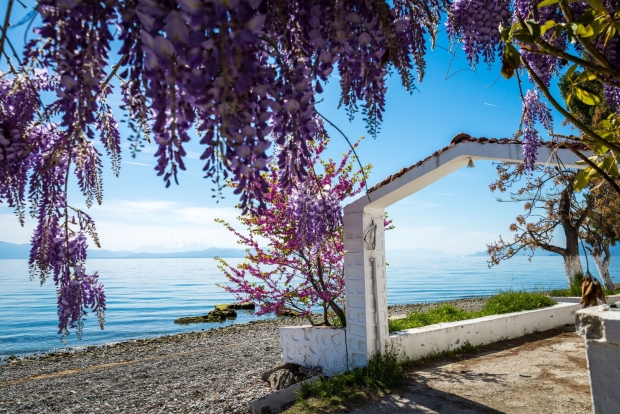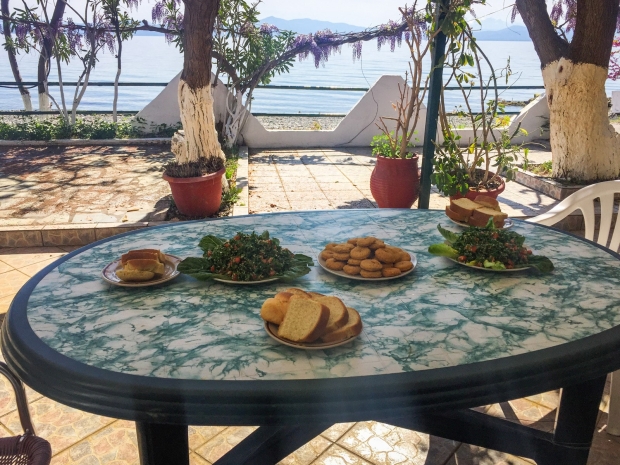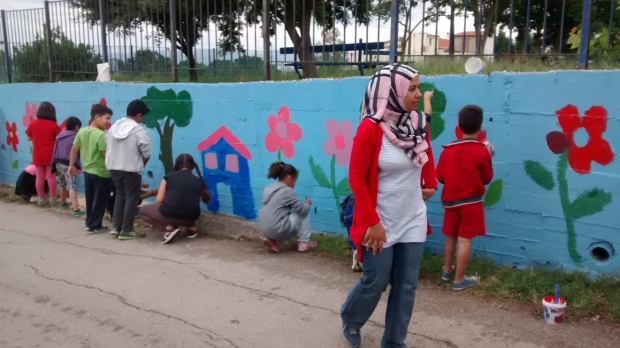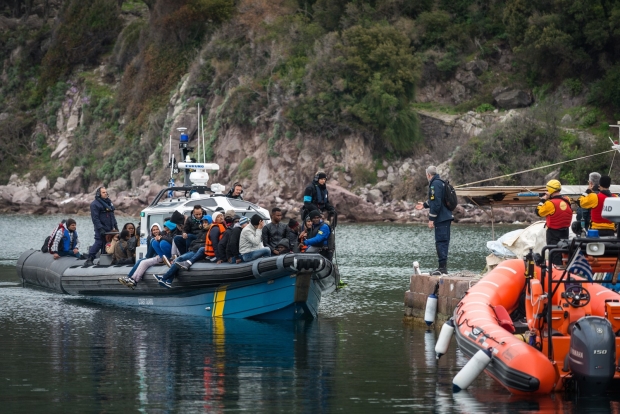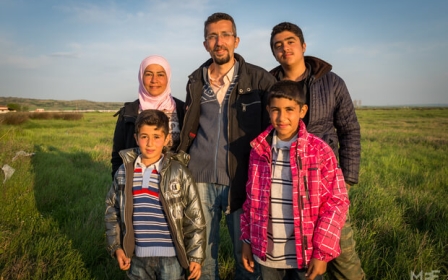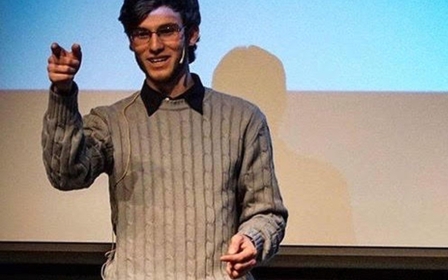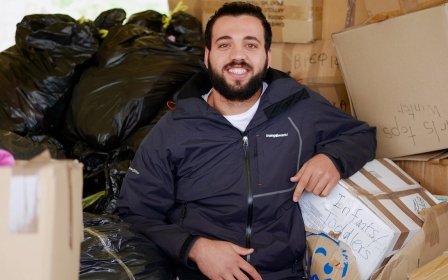Waiting for stability: A Syrian family’s tale of rejection and acceptance

ROVIES, Greece – As a pod of dolphins swim and play a few metres from the shore near her new home, 38-year-old Syrian mother of three Manar Aeid, originally from a town near Damascus, recalls the challenges her family has faced since their application for EU relocation was rejected a year ago.
A far cry from the setting of MEE's first interview with the family outside the Nea Kavala refugee camp in Thessaloniki in April 2016, the veranda of their new seaside apartment has a stunning view in the remote, tranquil holiday resort.
Despite an initial sense of relief and hope of rebuilding their lives in France, a month and a half later the family received the call they feared. “They didn’t give any reason why we got rejected,” Manar recalled. “They just told us that we don’t have any other options, only to take asylum in Greece.”
'My children are going to the local school. They learned Greek and they are doing very well'
- Manar Aeid, Syrian teacher and translator
What followed was a struggle against losing hope of providing a safer and brighter future for their children outside the confines of a refugee camp, a bureaucratic challenge to navigate the Greek asylum application process, and the daunting prospect of learning an entirely new language.
A year on, the family has succeeded in adapting and integrating into Greek life in the idyllic seaside village of Rovies in eastern Evia. With the help of Greek friends offering basic language lessons, internet programmes and a lot of practise and perseverance, the family has worked hard to learn the language - a key factor to integrating into Greek society. Today, Manar works as an translator and English teacher for SolidarityNow in a hotel that has been converted into an accommodation shelter and safe haven for Syrian refugees.
Her husband works part-time as a physiotherapist in Greece's second largest city, Thessaloniki. The northern city is located approximately 300 kilometres from Rovies. Due to the long commute, he spends three days a week in Thessaloniki and spends the rest of the week with his family in Rovies, as their children attend a Greek school in a community that has welcomed them.
"Now I’m OK,” Manar said. “I’m comfortable in my work, my children are going to the local school. They learned Greek and they are doing very well,” she said. In the beginning, being unable to communicate with the Greek people and feeling isolated from their host community was difficult for the family.
‘Watching the news for me is like seeing memories’
While the war in Syria rages on, Manar is totally focused on building a better life for her and her family in Greece, hoping to leave behind the memories of life under the bombs. “Watching the news for me is like seeing memories,” she said. “I don’t want to see it any more.”
A short while later, a Greek woman who works with Manar stopped by for a coffee on the veranda, chatting with Manar and her sons in Greek.
'People here are very friendly'
“The people here in the village are very friendly,” said Manar. “No one has bothered us. Only when we registered the children at the school, it was the first time they had foreigners in the school, so some people found it difficult in the beginning.”
'They soon accepted [my children] and now they have a lot of Greek friends'
- Manar Aeid, Syrian teacher and translator
Some of the parents were unhappy about her sons’ enrolment in the school, she recalls, and her youngest son had some problems with other pupils at first.
That soon changed, she explained, when they realised that her children were calm and respectful and cooperated well in school. “They soon accepted them and now they have a lot of Greek friends,” she said.
“I like the work so much because I’m helping my people, Syrian people,” she said. “People who are going through what my family went through.”
'I like the work so much because I’m helping my people, Syrian people'
- Manar Aeid, Syrian teacher and translator
Funded by the UN High Commissioner for Refugees (UNHCR), the UN Children's Fund, UNICEF, the EU and other renowned international organisations, SolidarityNow implements programmes designed to not only provide more comfortable accommodation but also to help develop bonds of solidarity between host communities and displaced individuals, positively altering their perceptions of one another while facilitating greater social integration.
Manar and her family first came to Rovies in May 2016 when they were hosted in the hotel as they waited for an answer about their relocation to France.
While overcoming the disappointment of rejection, hotel owner Andreas Vasiliou informed Manar that a position was available within the organisation for a translator. “I applied for the job and now I’m working here in the same hotel,” she said.
From 10 in the morning until 1.30 in the afternoon, Manar gives English lessons to Syrian children staying at the hotel.
'The problem is that it’s temporary. If I find a permanent job, it will be great for me'
- Manar Aeid, Syrian teacher and translator
In the afternoon, she works with a psychologist providing translation during therapy sessions for women and children. Her works ends at 7pm but she sometimes chooses to work later as a volunteer. “I’m free to go when I finish my work but sometimes I stay longer because I want to do something extra to help,” she explained.
Dreaming of a place to call home
In January 2015, the family survived the nightmare of escaping their war-torn homeland and the perilous boat crossing from Turkey to the Greek island of Samos. Since then, Manar says that her youngest son’s biggest dream is to have a place to call home.
“I like what I’m doing, and it’s a very nice place here,” she said. “The problem is that it’s temporary. If I find a permanent job, it will be great for me," she said.
Desperate from waiting
Many Syrians still have their lives on hold waiting for approval to get relocated to the Europe. According to Manar, there are between 80-100 Syrian refugees currently staying at the hotel where she works. Some of the hotel’s residents are waiting to be reunited with their families in other European countries and and some are waiting for EU relocation, she explained.
“We have families and some single women and men,” she said. “Some people in the hotel accept the situation, but most are very desperate from waiting. They have frozen their time and their life,” she said.
'Most Syrian refugees are very desperate from waiting. They have frozen their time and their life'
- Manar Aeid, Syrian teacher and translator
Although Syrian children at the hotel are permitted to attend Greek school, Manar believes they are sometimes reluctant to do so. This is in part because of the difficulty involved in learning the language, and also because they are holding on to the hope that they will succeed in gaining approval to be relocated to other European countries where they wish to begin rebuilding their lives.
At the same time, conditions in camps across the country are deteriorating under the pressure of overcrowding and limited resources.
'Hope is here'
Optimistic about the future of refugees in Greece, Andreas Vasiliou, the owner of the hotel in Rovies, believes that with a joint effort of the local community, together with the organisation SolidarityNow that supports him, the social integration of refugees no longer seems impossible.
“Hope is here,” he writes in a post published on the SolidarityNow website. “People change and learn if they are given the time to adapt to an unexpected change… They overcome the initial ignorance or fear and open their arms for the refugees; these people turn their solidarity into action and engage themselves in the refugees’ relief effort.”
On her part, Manar says that she is always eager to help other Syrian refugees who have been through similar experiences.
"I want to give hope to other Syrians here. It’s gives you relief when you can see someone is caring."
New MEE newsletter: Jerusalem Dispatch
Sign up to get the latest insights and analysis on Israel-Palestine, alongside Turkey Unpacked and other MEE newsletters
Middle East Eye delivers independent and unrivalled coverage and analysis of the Middle East, North Africa and beyond. To learn more about republishing this content and the associated fees, please fill out this form. More about MEE can be found here.


